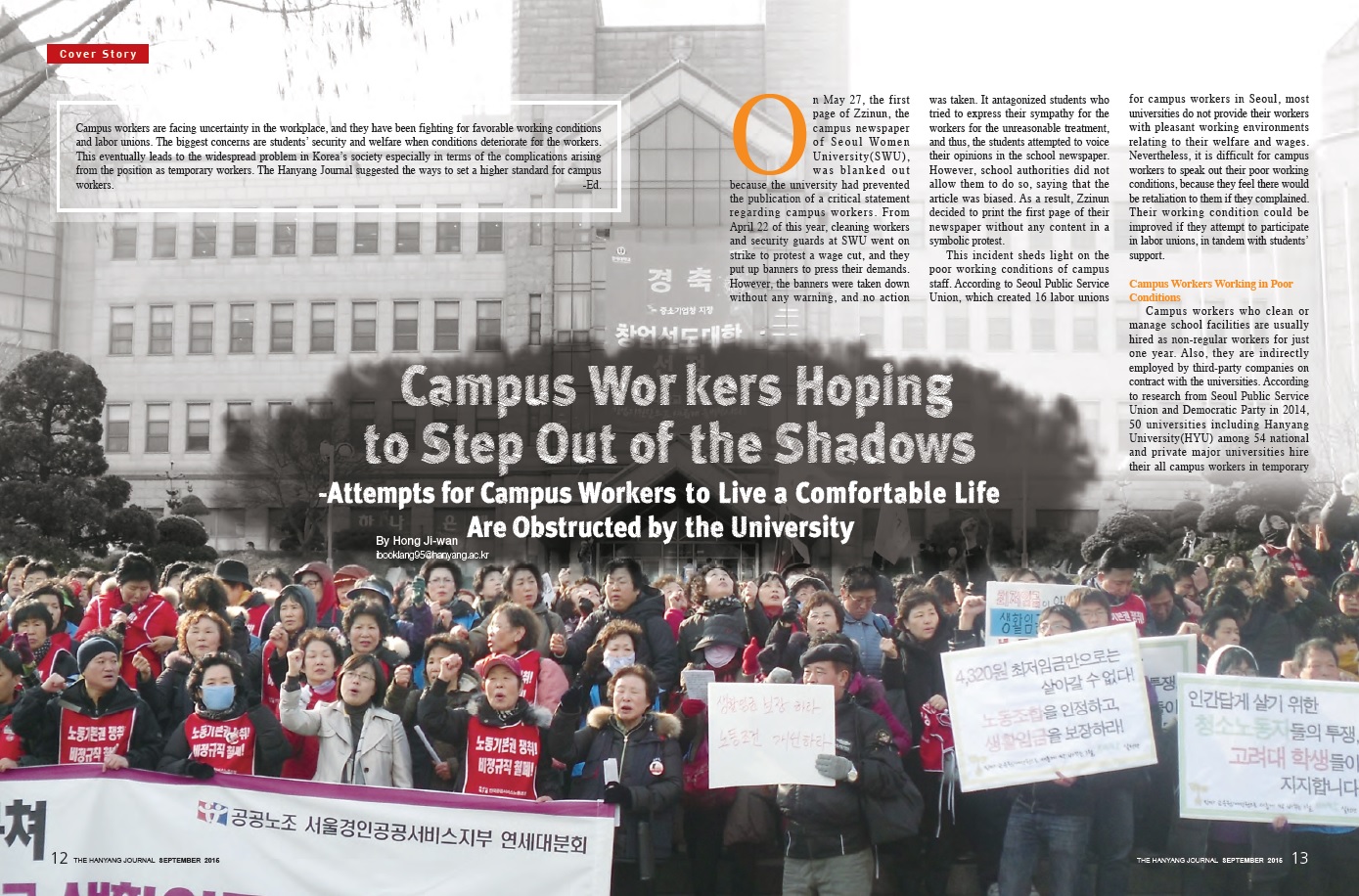
On May 27, the first page of Zzinun, the campus newspaper of Seoul Women University(SWU), was blanked out because the university had prevented the publication of a critical statement regarding campus workers. From April 22 of this year, cleaning workers and security guards at SWU went on strike to protest a wage cut, and they put up banners to press their demands. However, the banners were taken down without any warning, and no action was taken. It antagonized students who tried to express their sympathy for the workers for the unreasonable treatment, and thus, the students attempted to voice their opinions in the school newspaper. However, school authorities did not allow them to do so, saying that the article was biased. As a result, Zzinun decided to print the first page of their newspaper without any content in a symbolic protest.
This incident sheds light on the poor working conditions of campus staff. According to Seoul Public Service Union, which created 16 labor unions for campus workers in Seoul, most universities do not provide their workers with pleasant working environments relating to their welfare and wages. Nevertheless, it is difficult for campus workers to speak out their poor working conditions, because they feel there would be retaliation to them if they complained. Their working condition could be improved if they attempt to participate in labor unions, in tandem with students’ support.
Campus Workers Working in Poor Conditions
Campus workers who clean or manage school facilities are usually hired as non-regular workers for just one year. Also, they are indirectly employed by third-party companies on contract with the universities. According to research from Seoul Public Service Union and Democratic Party in 2014, 50 universities including Hanyang University(HYU) among 54 national and private major universities hire their all campus workers in temporary position. Also, other universities such as Sahmyook, Seoul Christian, Korean Bible and Hanyoung Theological University hire only a few workers in permanent position. The situations make it difficult for campus workers to secure adequate working conditions.
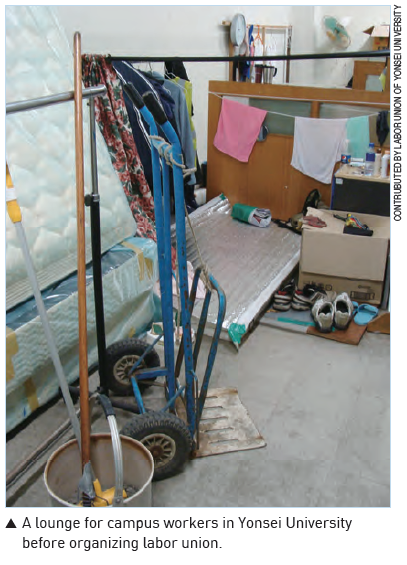
Employment instability resulting from the hiring process is the biggest problem. As their contracts are renewed each year, campus workers’ futures are always uncertain. In 2010, for instance, 33 cleaners and security guards at the ERICA Campus of HYU failed to renew their contracts. The workers were active in labor union activities and were dismissed for unreasonable reasons, such as displaying unpleasant impressions or submitting untruthful resumes. 13 of the redundant workers who had worked there for at least seven years held an assembly to regain their jobs. However, they were all finally dismissed and the labor union for workers at ERICA Campus remain dissolved to this day.
The second problem is that campus workers receive minimum wage or even less. According to the Seoul Labor Center, most of the workers have worked for minimum wage as temporary employees. There are numerous differences between permanent and temporary workers not only in terms of period of work but also treatment and wages. In the case of Sahmyook University, until 2011, all workers were hired as permanent workers. However, as the university started to hire workers indirectly through outsourced firms as temporary employees, the new workers have been paid about 40 percent lower than those who are permanent.
Moreover, in the case of Hankuk University of Foreign Studies(HUFS), campus workers do not even receive the minimum wage. General Students Association(GSA) of HUFS requested that minimum wages be guaranteed for campus workers beginning in June of 2015, but school authorities rejected the call. Jung Sae-bome, a Researcher of the Education and Public Relations Team of the Seoul Labor Center, said, “It is hard to earn a living on minimum wage. The low wages are of great concern to workers who have to support their families.”
Furthermore, campus workers do not receive adequate welfare coverage, and they even experience violations of their human rights in their workplace. At Inha University, cleaning workers have been banned from having lunch in the cafeteria with faculty staff since 1999. Also, workers at Yonsei University said that they had suffered from physical, verbal, and even sexual violence before joining their labor union.
In addition, campus workers who are able to keep their jobs are often given excessive tasks to do due to the dismissals of other staff members. In the case of HYU, two or three workers are responsible for the cleaning of an entire building such as the Student Union Building at Seoul Campus or the Conference Hall at ERICA Campus. A worker at HYU who requested anonymity said, “Although the number of workers is decreasing, new workers are not hired. That means, I have to do the work that should be done by the fired ones although I receive the same amount of wage. I think it is unfair, and I wish new workers would be hired instead of officials only thinking about cutting costs.”
The Reason Why Campus Workers Are Placed in Unreasonable Situations
During the 1990s, outsourcing became a common recruitment practice in Korea as a way to reduce labor costs. This was introduced not only to private enterprises but to public institutions, and even the government actively encouraged the practice, saying that it would help raising evaluations. Regarded as an effective managing technique, according to the Seoul Labor Union, most universities signed up for service contracts.
This form of contract employment led to the replacement from regular employees to non-regular employees in outsourced firms. As labor became cheaper, workers’ livelihoods plummeted as their wages fell sharply and as their employment statuses became increasingly unstable. However, universities shifted the responsibility onto outsourced companies, saying that they, the universities, were not in charge of wages or the welfare of temporary workers.
However, experts disagree. “School authorities just replace certain outsourced companies if their workers protest actions such as joining organized labor unions to avoid troubles. These outsourced companies keep a watch over or control the workers in advance to maintain, the outsourced company’s contract with the university. The situation only worsens for the workers. If workers complain about their unfair treatment, no one takes responsibility, and typically the workers are fired,” said Ryu Han-seung, a Director of the Education and Public Relations Team of the Seoul Labor Center.
Their Problems Becoming Our Problems
If the employment conditions for the workers do not improve, students will suffer as well. For example, on January 2015, 23 cleaning workers and security guards from the International Campus at Yonsei University were dismissed. A new service contract was made at Yonsei University earlier in the year, but the new company pushed campus workers who worked in the dormitory to accept a new contract that included unpleasant working conditions; they had to clean designated buildings in less time and for only 70 percent of their original wages. Eventually, they were fired when they protested against the unfairness of the contract. With the campus workers gone, security and the environment of the university compromised. Strangers often sneaked in the restaurants and even the dormitory that students used. This led to a rise of the number of robberies in the student residences.
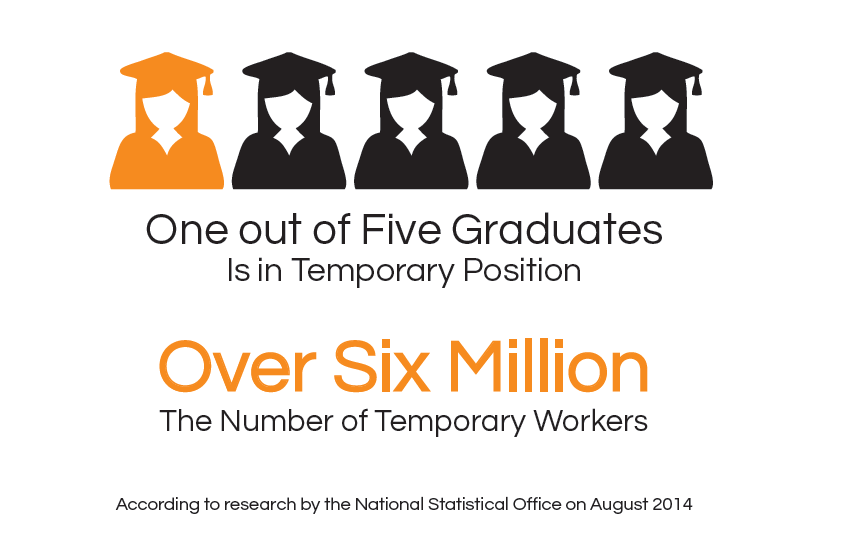
Most regular jobs have turned into temporary work. “Workers fight for minimal rights that should be guaranteed, but most of their efforts are in vain. If the situation continues, the same thing would happen outside college campuses with cities trying to hire most of their employees for temporary positions to cutback labor costs,” said Ryu. In reality, managers who are in charge of repairs and management of school facilities as permanent workers found their statuses increasingly reduced to temporary positions. Also, the job as a bank teller was considered a preferable job that could lead to higher social status and favorable income until mid 1990s, but it has become a non-regular job these days.
According to research by the National Statistical Office on August 2014, 21 percent of 8,998 workers who graduated universities were found to be in temporary positions. Also, last year, the number of temporary workers exceeded six million. This suggests that anyone can be a non-regular worker and be treated like current campus workers despite socioeconomic and educational backgrounds. “Students should pay attention to campus workers’ struggles against unfair treatment. Also, they should help them fight to change the current unfair labor structure,” said Jung.
For Better Labor Conditions and for Better Society
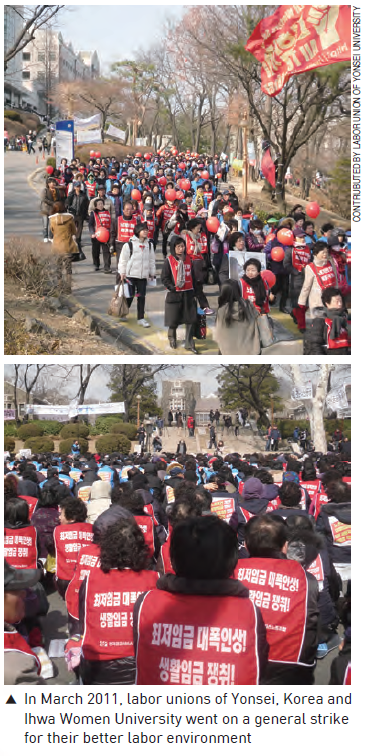
Fortunately, more and more university students are turning to support campus workers. In several universities such as Kyunghee University, Duksung Women’s University and HYU, GSAs of these universities have held festivals for campus workers. Leaders of the associations have read letters aloud, expressing appreciation for the campus workers’ efforts and donations have also made a donation for them. Kim Jin, a member of HYU’s GSA, said, “During the festival, there is normally ten times as much trash lying outside, and campus workers have difficulties cleaning all the areas. So GSA organized Clean Pub Contest awarding prizes to Departments which managed the most cleanest pub in 2015 Daedongje for helping them.”
Also, some students decided to step into the shoes of the campus workers. The Seoul Labor Summer 2015 project was organized by the Seoul Labor Union to experience a part of the daily work of campus workers. Students who participated in the program cleaned Gwangwoon University all day. Jung Sae-bome, a manager of the program, said, “The program was first held this year but received good responses. Students said that they felt that the workers’ efforts made convenient and comfortable student life on campus possible.”
However, the temporary events cannot fully resolve the fundamental worries of the campus workers which are employment instability and low wages. Yoo Anna, the head of the Organization of Seoul Public Service Union stressed the importance of unionization. “In order to promote and maintain adequate working conditions, the workers have to express their demands, and they have to form a labor union. These are the only solutions for workers, because only then will their plight be acknowledged and their livelihoods be protected under law.”
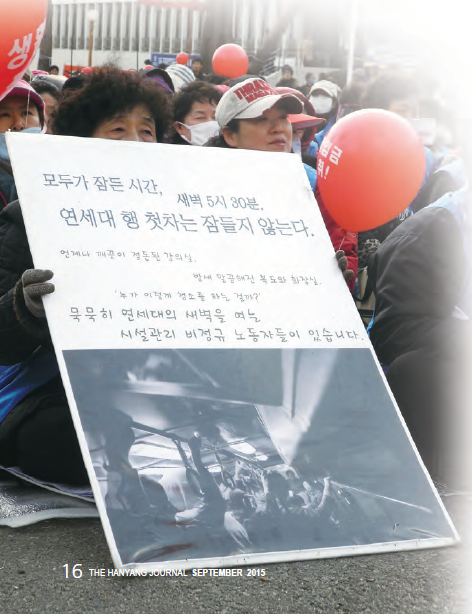
In fact, more than a thousand campus workers who joined labor unions have already experienced changes for the better condition. A cleaning worker who works at Kwangwoon University said, “Before the union, we bought cleaning equipment with our own money. Some people even scolded us when we used the elevator but we tried to ignore these unreasonable situations as we have to work in order to support our families. After organizing a labor union, however, we have been able to take time off when we are sick. It is important to join a labor union in order to exercise our rights.”
Although it is challenging for the workers to form labor unions due to interference from school authorities and outsourced service companies, the process can be made much easier if students help. In fact, the labor union for campus workers at Yonsei University was organized by students. The students researched the workers’ problems and disadvantages in their workplace. “Although the main participants of the labor union are campus workers, the students’ role in matter is very important. As universities belong to their students, school authorities cannot ignore their voices,” said Yoo.
After the labor union was formed, the labor environment for the campus workers changed for the better. In the case of Yonsei University, the campus workers now receive 6,550 won per hour, which is more than the current minimum wage of 5,580 won, while they had received less than minimum wages before joining the labor union. Also, according to the Labor Union of Yonsei University, harassment including physical or sexual, disappeared and the workload also decreased in comparison with the past.
Changes to Be Made at HYU
Both campuses at HYU do not have labor unions for campus workers and students do not seem to care about them. “Campus workers at Yonsei University and universities that have a labor union enjoy a favorable work environment. I know there is no labor union at HYU and I feel sad thinking that the workers there work under poor conditions. Please help those workers to organize a labor union,” said Han In-yong, a security guard at the Yonsei Engineering Research Park.
According to a recent survey by The Hanyang Journal, 73.5 percent among 300 Hanyangians answered that they never or seldom acknowledge the workers, and 94 percent responded that they were not interested in the campus workers’ labor environment. In fact, campus workers are often described as ghosts because they work behind the scenes and thus are invisible to the public.
Park Won-keun, an Executive of Labor and Solidarity of the GSA of Yonsei University said, “Campus workers are dedicated to their work every day for students on campus. I think students should change their mindsets and actively help creating better work conditions for our campus workers, helping them transform from ghosts to respected, hardworking human beings.”
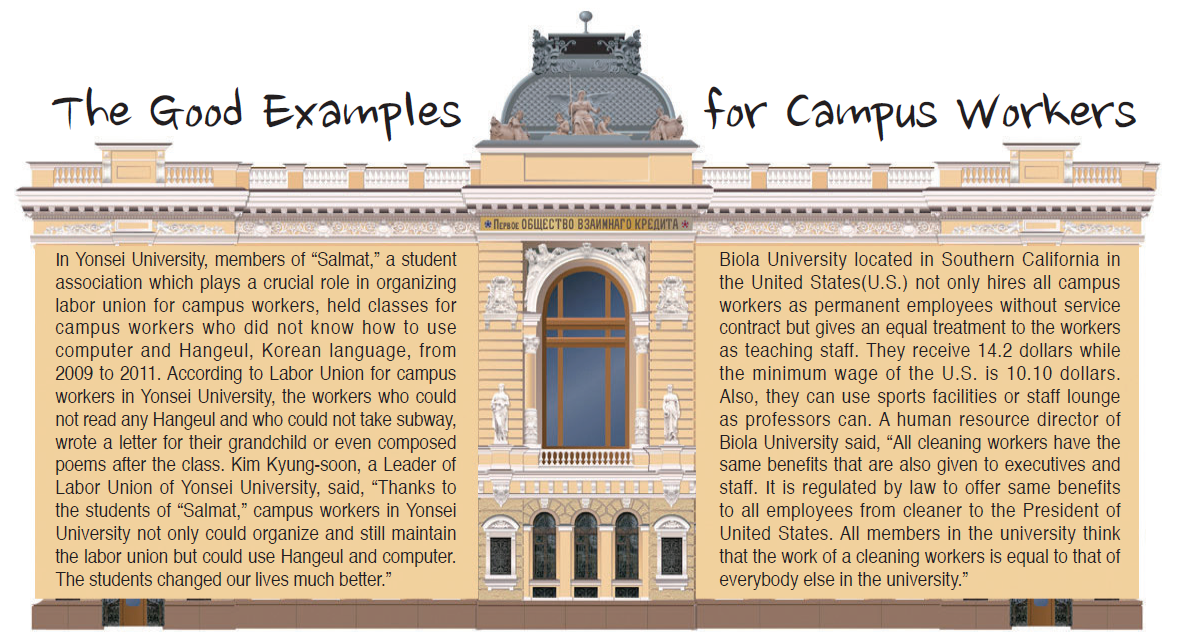
이 기사를 공유합니다

